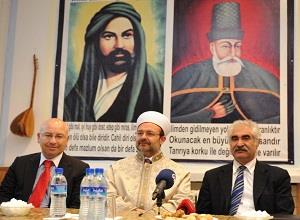(Ahlul Bayt News Agency) - Islam does not accept injustice of one group over another said Fermani Altun, head of an Alevi foundation in Turkey.
Speaking at a dinner in Ankara attended by politicians from the ruling Justice and Development (AK) Party, to celebrate the Islamic sacred month of Muharram, Altun added "we do not have an Shia-Sunni problem in Turkey'.
Alevi Muslims in Turkey follow a mystical branch of Islam which finds its roots in the Shia sect. The term Alevi itself means 'follower of Imam Ali (a.s)', referring to the son-in-law and companion of the Prophet Muhammad (s.a.w.w).
Head of the Ehl-i Beyt organization added: "The conflict rather has historical background, as it goes back ninety years to the building of the Turkish Republic - we need to understand the problem to find solution."
"We need to understand each other better" agreed Turkey's Religious Affairs head, Mehmet Gormez.
One of the significances of the month of Muharram for Alevis is the Kerbela incident. This refers to when the grandson of the Prophet Muhammad, Imam Hussein (a.s) were martyred. It is associated with sadness and remembering the martyrdom of Imam Hussein (a.s) for both Shia and Sunni Muslims all over the world. The leader of World Ehl-i Beyt, Fermani Altun said, "the sadness we feel for the incident does not only belong to one group – Shia - but is common value of entire Muslims".
Parliament Speaker of Turkey, Cemil Cicek said that [Imam] Hasan (a.s) and [Imam] Hussein (a.s) are also important figures for Sunnis. "We all have the names Hasan and Hussein in our families," said Cicek.
President of the Constitutional Court of Turkey, Hasim Kilic also said that "the madness we live in need to turn into a peace. We support all the groups and their demands, except those groups who are involved in terrorist activities. He also touched on current debate in Turkey related to location of Alevi prayer places as this issue needs to be solved immediately. "The historical mistakes need to be rediscussed and solved."
"Many Muslim countries are suffering due to ethnic and religious problems. We as Turkish citizens need to learn our lessons and live peacefully together."
/106

